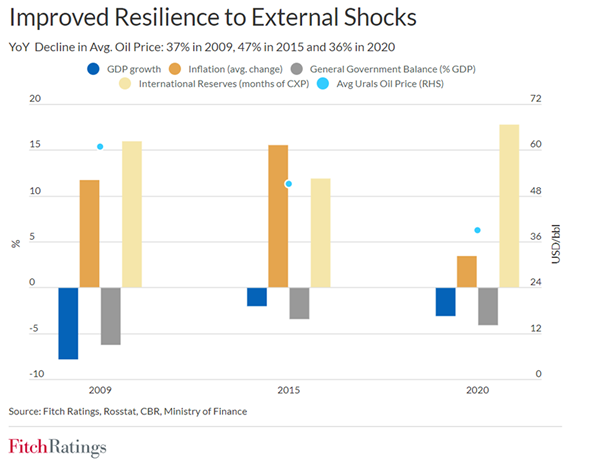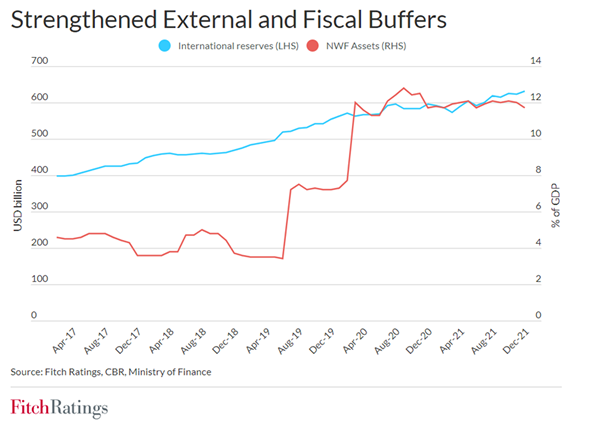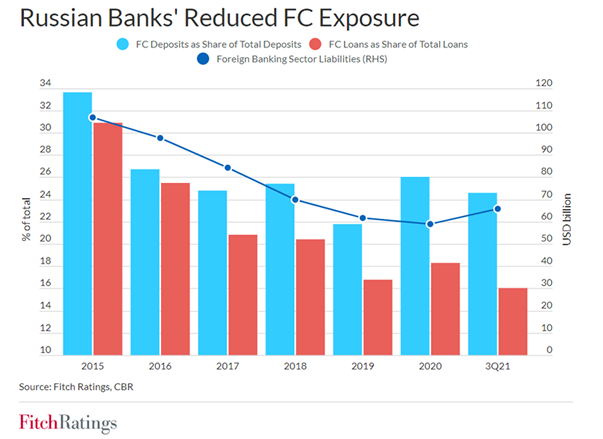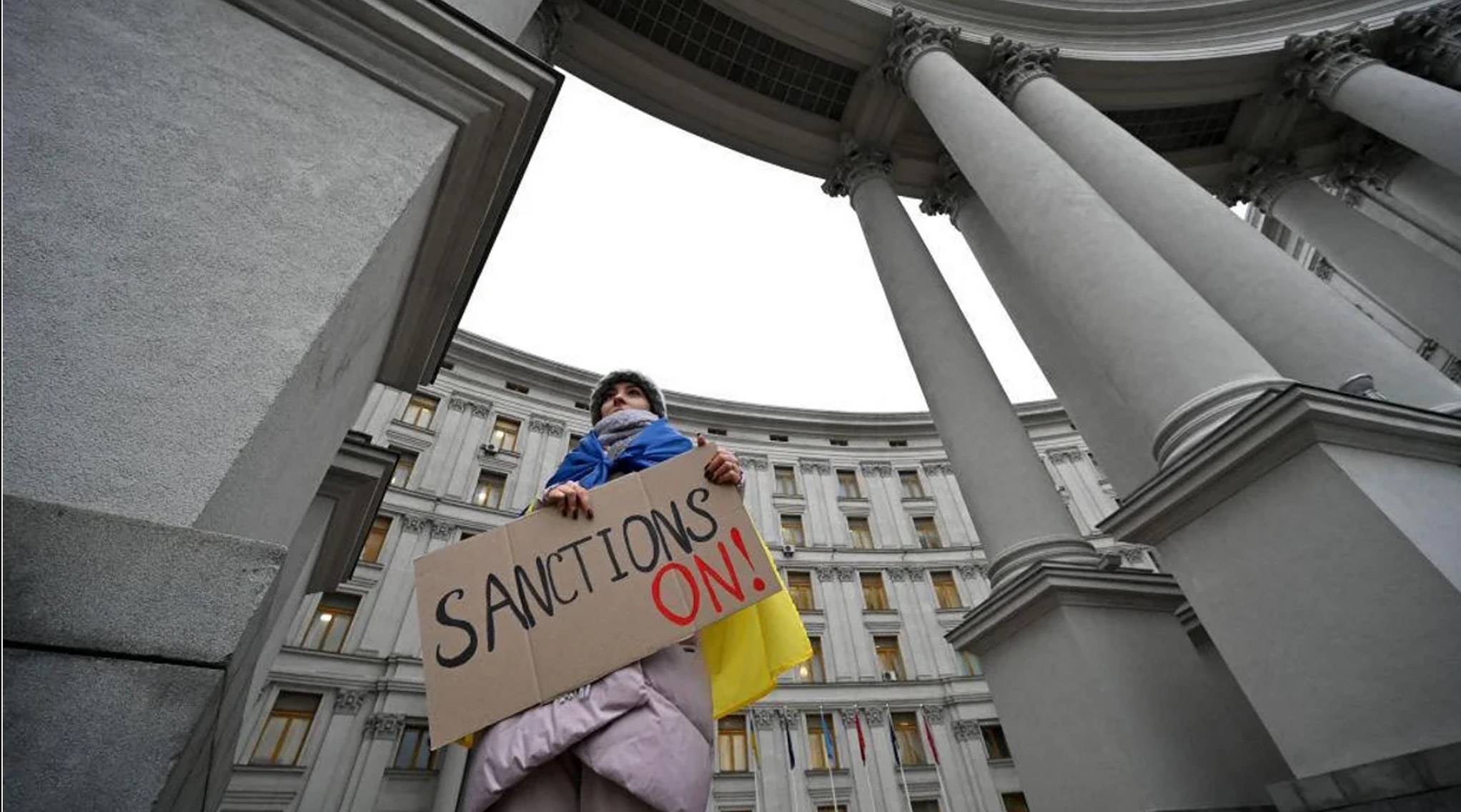Wednesday, February 23, 2022 / 05:59 AM / by Fitch Ratings / Header Image Credit: Protocol
Severe sanctions on Russia could have negative rating implications for the sovereign and banks, Fitch Ratings says. For the sovereign, this would depend on their capacity to undermine macroeconomic and financial stability, or impede sovereign debt service payments, in line with Fitch's rating sensitivities. For banks, sanctions that impede the ability to execute foreign currency (FC) payments could be ratings negative.
Our base case is that new sanctions would not be sufficiently severe to warrant negative rating actions, but the risk of this scenario has become more significant in recent weeks.
Russia's 'BBB'/Stable rating is constrained by existing sanctions and the prospect of additional sanctions weighing further on GDP growth, financing flexibility and prospects for structural improvements, which are credit weaknesses relative to peers. The probability of some form of new sanctions was high when we affirmed the rating in December.
Tensions over Ukraine have increased the risk of conflict and more far-reaching sanctions, although our base case remains there is no full-scale invasion. Sanctions would likely be calibrated according to the extent of any Russian operations, which is highly uncertain.
Triggers could include contained military operations, or cyber-attacks. In the absence of conflict, more likely sanctions include preventing US investors transacting in secondary market sovereign debt, and additional sanctions on senior officials, government institutions and Vladimir Putin's supporters' wealth. Alone, these would be unlikely to cause ratings pressure.
Russia's strengthened macro-policy framework since 2015, the build-up of large external and fiscal buffers and reduced external exposures have enhanced resilience to shocks.

US secondary market sovereign debt sanctions would further constrain Russia's fiscal financing flexibility and foreign investment, while capital outflows and a weaker Russian rouble could precipitate tighter policy. However, this would not significantly affect macro-stability or buffers, which include a Federal Treasury cash reserve and National Wealth Fund assets totaling 16.5% of GDP, and the 'BBB' category's highest international reserves (17 months of CXP).
Non-resident OFZ holdings have fallen to 20.5% of the total (below 3% of GDP); we forecast general government surpluses (average 1.3% of GDP in 2022-2023) and the banking sector can absorb more debt. The Central Bank of Russia could provide additional liquidity and address market volatility through FX interventions.

Nevertheless, heightened risks around Ukraine and the US draft Menendez Bill underline the potential in a downside scenario for measures with a larger sovereign credit impact, such as preventing systemic banks and corporates from transacting in US dollars or accessing the international payments system, or broad-based energy market sanctions disrupting exports.
The biggest impact on banking sector creditworthiness would be if sanctions impaired large state-owned banks' ability to execute FC payments, particularly through banning dollar transactions. Exclusion from SWIFT's messaging system would also cause sizeable near-term disruption, given alternative systems have limited international participation. We do not expect such measures in our base case, partly because they would impede repayment of foreign creditors, and consider sanctions on less systemically important banks more likely.
The rating impact on banks of such severe sanctions would depend on their formulation, especially how far payments to creditors could be channelled through alternative payment systems and other Russian banks, and exposures switched to other currencies or settled with Asian and European counterparties. Bank ratings would likely be placed on Rating Watch Negative if such sanctions were imposed, and could be downgraded if greater uncertainty over the ability and willingness to service debt persisted. If sanctions resulted in freezing banks' FC assets, Viability Ratings would also come under pressure.
The impact on financial metrics is unlikely to result in downgrades given banks have generally large liquidity buffers to offset deposit outflows, foreign payment schedules are not onerous (reflecting adjustment to earlier sanctions) and potential regulatory forbearance, if needed.

Rated Russian corporates are generally well-positioned to cope with sanctions. Balance sheets are strong, including FC positions, and corporates with FC external debt typically benefit from export receipts. The biggest impact would be if sanctions restricted corporates' ability to access FC cash or draw credit lines, and depends on whether Russian banks could still transact in dollars and international banks could service export cash flow and facilitate FC cash accumulation. Lower-rated Eurobond corporate issuers with short-term maturities are most sensitive to such measures.
 Lagos, NG • GMT +1
Lagos, NG • GMT +1











 209 views
209 views








 Sponsored Ad
Sponsored Ad
 Advertise with Us
Advertise with Us









